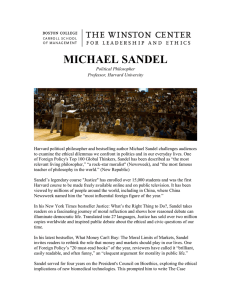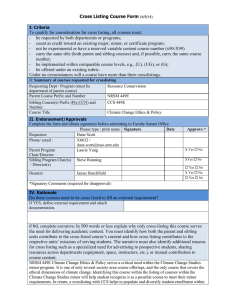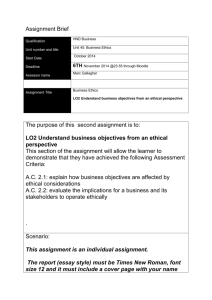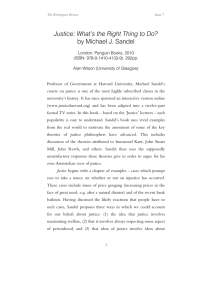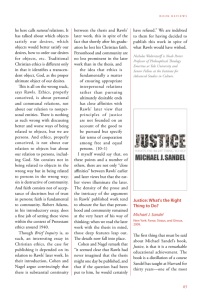CONTEMPORARY ETHICAL ISSUES Religious Studies 361 Fall
advertisement
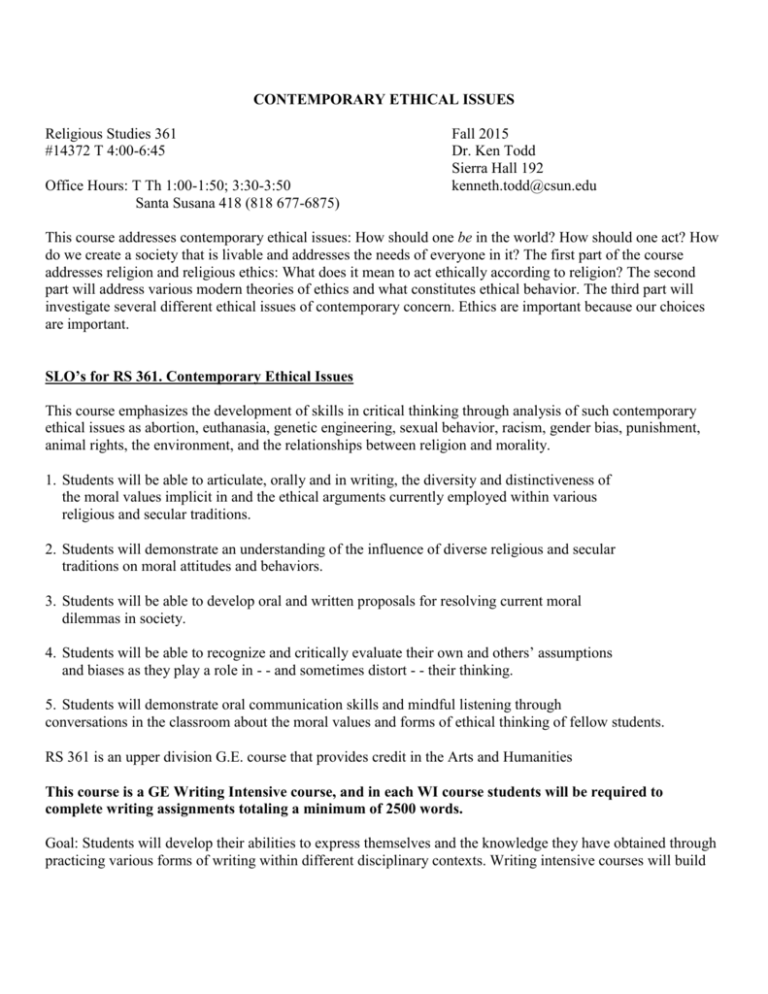
CONTEMPORARY ETHICAL ISSUES Religious Studies 361 #14372 T 4:00-6:45 Office Hours: T Th 1:00-1:50; 3:30-3:50 Santa Susana 418 (818 677-6875) Fall 2015 Dr. Ken Todd Sierra Hall 192 kenneth.todd@csun.edu This course addresses contemporary ethical issues: How should one be in the world? How should one act? How do we create a society that is livable and addresses the needs of everyone in it? The first part of the course addresses religion and religious ethics: What does it mean to act ethically according to religion? The second part will address various modern theories of ethics and what constitutes ethical behavior. The third part will investigate several different ethical issues of contemporary concern. Ethics are important because our choices are important. SLO’s for RS 361. Contemporary Ethical Issues This course emphasizes the development of skills in critical thinking through analysis of such contemporary ethical issues as abortion, euthanasia, genetic engineering, sexual behavior, racism, gender bias, punishment, animal rights, the environment, and the relationships between religion and morality. 1. Students will be able to articulate, orally and in writing, the diversity and distinctiveness of the moral values implicit in and the ethical arguments currently employed within various religious and secular traditions. 2. Students will demonstrate an understanding of the influence of diverse religious and secular traditions on moral attitudes and behaviors. 3. Students will be able to develop oral and written proposals for resolving current moral dilemmas in society. 4. Students will be able to recognize and critically evaluate their own and others’ assumptions and biases as they play a role in - - and sometimes distort - - their thinking. 5. Students will demonstrate oral communication skills and mindful listening through conversations in the classroom about the moral values and forms of ethical thinking of fellow students. RS 361 is an upper division G.E. course that provides credit in the Arts and Humanities This course is a GE Writing Intensive course, and in each WI course students will be required to complete writing assignments totaling a minimum of 2500 words. Goal: Students will develop their abilities to express themselves and the knowledge they have obtained through practicing various forms of writing within different disciplinary contexts. Writing intensive courses will build upon the skills gained in the Analytical Reading and Expository Writing section of Basic Skills. In each WI course students will be required to complete writing assignments totaling a minimum of 2500 words. Student Learning Outcomes Students will: 1. Develop and clearly define their ideas through writing; 2. Ethically integrate sources of various kinds into their writing; 3. Compose texts through drafting, revising, and completing a finished product; 4. Express themselves through their writing by posing questions, making original claims, and coherently structuring complex ideas; 5. Revise their writing for greater cogency and clarity; 6. Utilize adopted communication modes and documentation styles of specific disciplines (MLA, APA, Chicago, CBE, etc.) where appropriate. Student Learning Outcomes for GE in Arts and Humanities Goal: Students will understand the rich history and diversity of human knowledge, discourse and achievements of their own and other cultures as they are expressed in the arts, literatures, religions, and philosophy. Students will: 1. Explain and reflect critically upon the human search for meaning, values, discourse and expression in one or more eras/stylistic periods or cultures; 2. Analyze, interpret, and reflect critically upon ideas of value, meaning, discourse and expression from a variety of perspectives from the arts and/or humanities; 3. Produce work/works of art that communicate to a diverse audience through a demonstrated understanding and fluency of expressive forms; 4. Demonstrate ability to engage and reflect upon their intellectual and creative development within the arts and humanities; 5. Use appropriate critical vocabulary to describe and analyze works of artistic expression, literature, philosophy, or religion and a comprehension of the historical context within which a body of work was created or a tradition emerged; 6. Describe and explain the historical and/or cultural context within which a body of work was created or a tradition emerged Required Texts: Michael Sandel, Justice: What’s the Right Thing to Do? Other readings will be online via Moodle. These online readings should be printed out and brought to class. Accessing them online during class is not acceptable. Course Requirements: Regular attendance at all classes and effective participation in class discussions. Respectful behavior toward all one’s classmates and instructor. This means turning off one’s cellphone upon entering the class and NO TEXTING during class. Students texting/playing with their cellphones during class will receive one warning and then be asked to leave and the offending student’s grade will be lowered by 2%. Careful reading of all assigned materials prior to class for the week. Note that RS 361 is actually two classes: On the one hand, it is an ethics class; on the other hand, it is a writing class. No matter where you go or what profession you ultimately choose, people will judge you based on your ability to write; unclear writing is generally a sign of unclear thinking. This class is going to concentrate on improving your writing, as well as honing your ability to think ethically. Grading: Initial paper (1 page): 50 points 4 papers (2 pages): 100 points each Pop quizzes will be 20 points each (Note that if a student misses more than 2 pop quizzes, all missed pop quizzes will become zeros). Seminar presentations and participation, while not assigned a specific number of points, will also affect the grade. You may not submit a paper written for another class. Late papers will be penalized 10% per day and then not accepted more than three days late. Grade Scale: 100-97% A+ 93-96% A 92-90% A87-89% B+ 83-86% B 80-82% B-, etc. Class ScheduleW eek 1 Aug. 24 Week 2 Aug. 31 Introduction/Course Overview Religion and Ethics Jewish Ethics Writing Workshop! Week 3 Sept. 7 Christian Ethics Islamic Ethics Short Paper due Week 4 Sept. 14 Hindu Ethics Buddhist Ethics Week 5 Sept. 21 Week 6 Sept. 28 Chinese Ethics “A Better Way Out” (Moodle) “Doing the Right Thing” Sandel, ch. 1 “Utilitarianism” Sandel, ch. 2 Paper #1 due Week 7 Oct. 5 “Libertarianism” Sandel, ch. 3 “Markets and Morals” Sandel, ch. 4 Week 8 Oct. 12 “Kant” Sandel, ch. 5 “There’s No Way Out of It” (Moodle) Week 9 Oct. 19 Movie: “A Dry, White Season” Paper # 2 due Week 10 Oct. 26 “Rawls” Sandel, ch. 6 “Arguing Affirmative Action” Sandel, ch. 7 Week 11 Nov. 2 “Aristotle” Sandel, ch. 8 “Obama and Counterterror: The Ignored Record” (Moodle) Week 12 Nov. 9 Movie: “Paradise Now” Paper #3 due Week 13 Nov. 16 “Dilemmas of Loyalty” Sandel, ch. 9 “A New Solution: The ‘Climate Club’” (Moodle) Note: this is Paper #4 topic Week 14 Nov. 23 “Justice and the Common Good” Sandel, ch. 10 “Innovation: The Government was Crucial After All” (Moodle) Week 15 Nov. 30 “Southern Comfort” (Moodle) “Are We Puppets in a Wired World?” (Moodle) Paper #4 due Week 16 Dec. 7 No Class “Money is like blood. You need it to live but it isn’t the point of life.” —Kabir Sehgal

